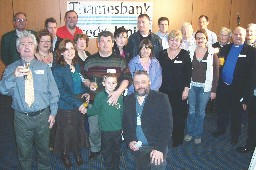Learning disability or vision difficulties?
Local optician carries out Vision Therapy for children
If your child is having difficulty at school or exhibiting any other sign of a learning disability, this may have nothing to do with their levels of motivation, commitment or intelligence. In fact many children with learning difficulties have above-average IQs and simply process information differently from their peers.
CLASSIC Eyes Eye Care Centre in Brentford Lock work with children to ensure that their complete visual system is working properly, as about 80 percent of what a child learns in school is processed visually.
In order for vision to help rather than hinder learning, all three parts of their vision must be working properly, and these include:
- The state of their eyes, which pertains to eye health, visual acuity and refractive errors such as nearsightedness, farsightedness and astigmatism.
- The functioning of their eyes, which encompasses focusing, the eyes working in tandem and eye movement. A child with a focusing problem may have difficulty reading the chalkboard because he/she cannot change focus rapidly from near to far. If the eyes do not function properly as a team it may lead to eyestrain, double vision, headaches and difficulty sustaining attention. Inability to control eye movements means a child will lose his place frequently while reading.
- Visual perception includes understanding what you see, identifying it, judging its importance and linking it to previous information.
Many professionals focus only on the first of the three parts of vision — the state of the eyes, specifically refractive errors. If sight is defined as seeing a certain size letter on a chart at a specific distance, your child may have 20/20 eyesight with or without glasses, but poor visual skills. The difference is critical. An eye exam by most eye care professionals and school vision screenings ignore 9 out of 10 visual abilities necessary for a child to achieve full potential in school. Very few High Street Opticians or Optometrists have the time or the interest in detecting and treating these visually related reading problems.
Symptoms of learning-related vision problems include:
• Blurred vision at any distance.
• Double vision.
• Eyes that are crossed or turned in, or that move independently of each other.
• Dislike or avoidance of close work.
• Short attention span for the child's age.
• Turning or tilting the head to use one eye only, or closing or covering one eye.
• Placing the head close to the book or desk when reading or writing.
• Excessive blinking or rubbing the eyes.
• Losing place while reading, or using a finger as a guide.
• Trouble finishing timed written assignments.
• Difficulty remembering what was read.
• Omitting or repeating words, or confusing similar words.
• Persistent reversal of words or letters.
• Difficulty remembering, identifying or reproducing shapes.
• Difficulty with sequential concepts.
• Poor eye-hand coordination.
• Evidence of developmental immaturity.
• Headaches, nausea and dizziness.
• Burning or itchy eyes.
• Colour blindness
If vision is defined more broadly as seeing clearly, understanding what you see and processing what you see, some children will be diagnosed with a visual dysfunction that affects how they learn. These hidden visual difficulties are common and children with vision disorders rarely complain or tell others, because they don’t even realize they have a problem.
Teachers and parents who recently attended a Visual Information Processing workshop at CLASSIC Eyes, were pleased to learn that many learning difficulties associated with visual dysfunction may be effectively treated, particularly if they are identified at a young age. Children ideally below the age of eight should have a comprehensive eye examination that focuses on all three parts of their vision.
If it is found that the child's visual function is not an issue, then the family doctor should also be consulted.
Yolande, the optometrist at CLASSIC Eyes, can be contacted on 020 8568 7778 for an appointment or to conduct screenings at schools in West London.
2 Feb 2006
Related links
 Members of Thamesbank celebrate at the launch party |
|
| Related Links | |